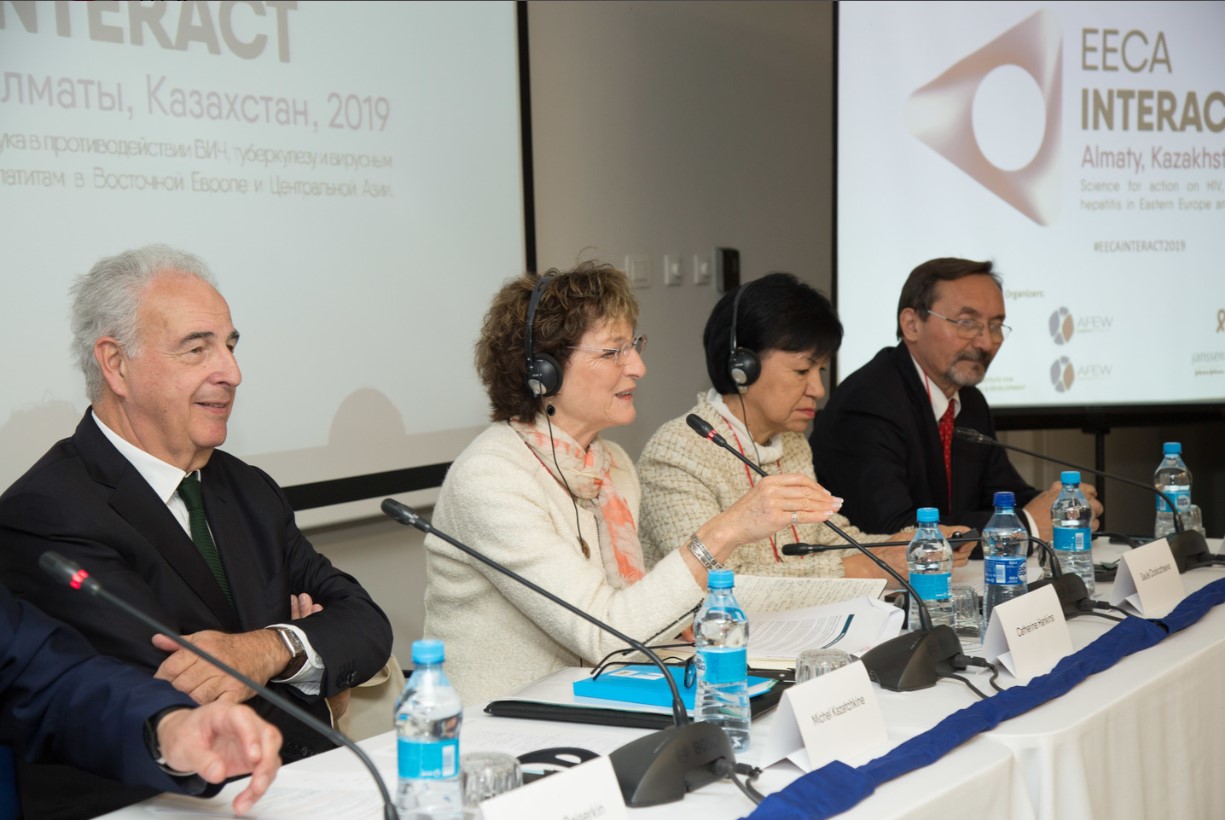
05 Nov Virtual EECA INTERACT Workshop to be held on 11 November
The Eastern Europe and Central Asia INTERACT Workshop will take place next Thursday, 11 November. This is the second workshop in the Eastern Europe and Central Asia region on HIV, tuberculosis (TB), hepatitis C, harm reduction and sexual and reproductive health, returning this time virtually due to the COVID-19 pandemic. This workshop was first held in Almaty, Kazakhstan in 2019. AIGHD and its co-hosting partner, AFEW International, are excited to see the return of this relevant event to help build capacity in a region greatly affected by the aforementioned health issues.
The EECA Region, or Eastern Europe and Central Asia, is currently the home of the fastest-growing HIV epidemic in the world, and millions are in need of antiretroviral therapy, as well as treatment for comorbidities such as hepatitis C and especially tuberculosis (TB). In 2020, UNAIDS reported 140,000 new infections in the EECA Region, which already has 1.6 million people living with HIV/AIDS (PLWH). This region also has the highest rates of multidrug-resistant TB (MDR-TB) in the world. Furthermore, the EECA Region is significantly lagging behind in terms of meeting UNAIDS’ 95-95-95 goals, meaning 95% of PLWHA tested, 95% of that number treated, and 95% of that number virally suppressed. Only 70% of PLWH in Eastern Europe and Central Asia know their status, while only 53% have been properly linked to care.
Clearly, whether for HIV testing or treatment purposes, uptake of health services is limited in Eastern Europe and Central Asia. This largely has to do with obstacles affecting the profile of those particularly susceptible to HIV, tuberculosis, and hepatitis C, amongst other health issues. The vast majority of those who are susceptible to the health issues covered in the EECA INTERACT workshop are members of vulnerable key populations, such as people who inject drugs (PWID), men who have sex with men (MSM), female sex workers (FSW), and prisoners. Such groups face legal barriers, as well as social issues like stigma and discrimination, all of which make accessing treatment difficult.
In order to address this emerging health crisis, the crux of this workshop is to help build health capacity in the EECA Region by bringing scientists, civil society representatives, and government officials from Eastern Europe and Central Asia to share knowledge related to the epidemiology, treatment, pathogenesis and prevention of HIV, TB, and hepatitis c, amongst other health issues. This year, speakers and co-chairs hail from a wide variety of countries across the region, namely Russia, Kazakhstan, Poland, Armenia, Belarus, Georgia, Lithuania, Moldova, Estonia and Ukraine.
The Scientific Co-Chairs of this workshop, AIGHD-affiliate Prof. Catherine Hankins and Prof. Michel Kazatchkine, Chairman of AFEW International, have worked extensively in the field of HIV and harm reduction over their long and remarkable careers. Prof. Catherine Hankins is a community health specialist and epidemiologist who has conducted numerous HIV studies amongst vulnerable populations, served as Chief Scientific Adviser to UNAIDS, and was Scientific Chair of the annual INTEREST conference on HIV in Africa for six years, to name a few highlights of her career. Prof. Michel Kazatchkine is a physician, researcher, and activist, who served as Executive Director of the Global Fund to fight AIDS, Tuberculosis and Malaria until 2012, and since 2018 has served as a Special Advisor for UNAIDS on Eastern Europe and Central Asia.
Together, Prof. Hankins and Prof. Kazatchkine have put in all of their efforts into making a cutting-edge programme to showcase health research and interventions in the EECA Region for this pertinent workshop. The first panel at this event will focus on the integration of HIV, TB, and overdose prevention services, and will feature preliminary findings and experiences where people-centered care is being effectively provided in the region. The second panel will focus on surveillance, data collection, validation and analysis. Data poses a significant issue when the majority of those afflicted by HIV are members of vulnerable key populations. This panel will focus on new methods of addressing this complex data collection puzzle, featuring epidemiological and triangulation studies, as well as integrated bio-behavioral surveillance. The last session is the most timely, focusing on positive developments in healthcare provision in relation to the COVID-19 pandemic, many of which may provide lessons for the future of health service provision in the EECA Region. We look forward to this exciting and relevant workshop, and hope you register here.
